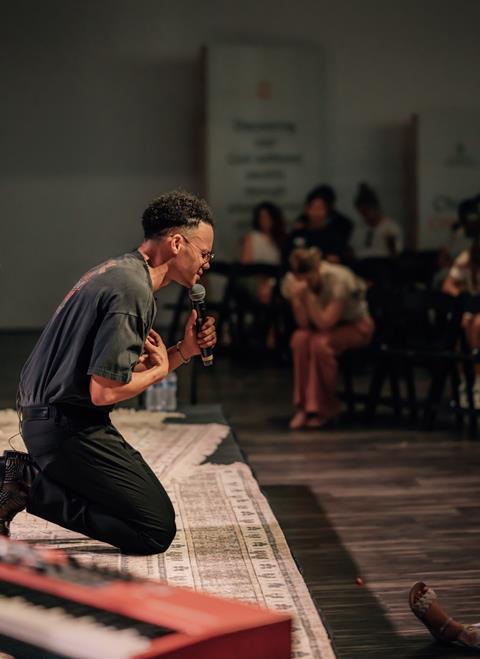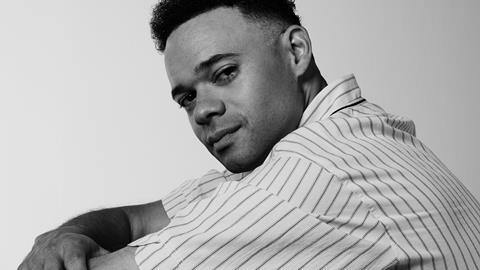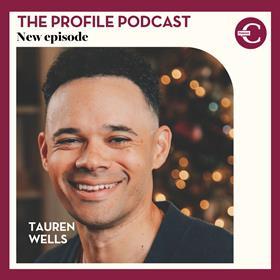The pastor and ‘Hills and valleys’ singer reflects on the voices that shaped him, the disappointment that almost derailed him, and why he believes today’s young men don’t need a platform – they need a father
Grammy-nominated music artist and newly appointed pastor Tauren Wells is riding high. For the millions of fans worldwide who resonate with Wells’ music and message, it may appear the 39-year-old’s journey has been seamless. But the road to right now has been marked by deep challenges and painful rejections.
Wells first came to prominence as the frontman of Christian pop band Royal Tailor (2004-15), which brought its infectious blend of pop, funk and soul to churches and youth events across the USA. Yet despite his passion and musical talent, Wells often found himself misunderstood, especially within the very church communities he was trying to serve.
Wells’ unconventional sound and style was a struggle for some in America’s most conservative churches to accept. Not everyone thought it appropriate that he danced while ministering, or that he was signed to a record label. The criticism was harsh, and Wells was dropped from youth conferences, disinvited from events and even told he wasn’t fit to lead worship. The rejection shook him deeply.
The turning point came through his father-in-law, who was also the pastor of Royalwood Church, Texas. “He said: ‘I believe in you, in your unique gifts, in what God’s given you the exact way he gave it to you. I believe in your songs, your ministry.’” That affirmation sparked a new season of confidence and creativity in Wells’ life.
In 2015, Wells left Royal Tailor to pursue a solo career. His music, marked by authenticity and vulnerability, began reaching new audiences. Songs such as ‘Hills and valleys’, ‘Known’, and ‘God’s not done with you’ struck a chord with listeners who saw themselves in his stories of identity, struggle and faith. He’s since earned numerous awards, built a massive online following (more than 1 million subscribers on YouTube). As if that wasn’t enough, he and his wife, Lorna, have just planted Church of Whitestone in Austin, Texas.
In the wake of an increased awareness about the spiritual formation of young men, the singer has a compelling message: boys don’t need a platform – they need a father. It’s a sentiment shaped by his own journey, reflecting the deep need for guidance, affirmation and love from spiritual and fatherly figures. His story is not just one of success but of surrender, perseverance and the power of being truly seen and supported.

Tell us about the influence of your father in-law, who has played an important role in your calling.
My father-in-law came into my life when I was going through a difficult time with the church. I was making music that wasn’t choir or praise and worship music, and people had a hard time with that. I was dancing, and people had a hard time with that. Then I got signed to a record label – and people really had a hard time with that.
There was the disappointment of realising the conflicting messages I’d grown up hearing – things like: “This generation is going to write the greatest songs”, or: “Take the gospel further”, or: “This generation’s going to do something great for God that none of the previous generations have.” I felt like I was doing that – but I was villainised for it. I wasn’t allowed to lead worship at certain events and got cancelled from youth conferences, because the route I was taking wasn’t familiar.
My mission is to call greatness out of others. I tried to do that through music, but nothing gives you a better opportunity to develop people than being a pastor
My father-in-law was the voice that gave me permission to become who God called me to be. He reaffirmed me and said: “I believe in you, in your unique gifts, in what God’s given you the exact way he gave it to you. I believe in your songs, your ministry.” He blessed me with his generosity, with platform, with time.
I believe every person needs a pastor or spiritual leader that is willing to pour into them and allow them to evolve into who God has called them to be.
The Netflix show Adolescence has prompted a huge debate in the UK about young boys and lack of role models. What would you say to young people who haven’t been blessed with the role models and encouragers that you have?
That’s a great question. I haven’t watched Adolescence, so I’m not familiar with it yet – I’m usually a late adopter.
But this isn’t the first time men have been undermined. I think back to the birth of Jesus, when an entire generation of young men was swept off the planet. There’s always been an attack on manhood – on the spiritual and emotional development of men.
I want to be careful how I say this – no one is more pro-woman than Jesus. He broke every societal norm to amplify God’s heart towards women. How crucial the woman’s role in society is. How expansive the role women can play in society.
That said, we need to understand that God has a place and a role for men and women – and that he designed us to work complementary to each other, to reveal his heart for family and, to reveal God’s heart for society and culture.
Being obedient is saying yes to every little thing that you think has nothing to do with what God’s calling you to
I feel like in the effort to elevate women, we believe that the only way to do it is by cutting men down. If we keep saying “the future is female”, it makes the male feel irrelevant. I believe the future is kingdom – and God’s kingdom uses men and women.
If you’re a young man looking for a role model, I say look at Jesus. He valued everyone because he understood his own value. A lot of young men don’t have the affirmation of a father – it’s a vicious cycle.
The reason Jesus could carry out his mission was because the voice of the Father spoke and said: “This is my Son in whom I’m well pleased” [see Matthew 3:17]. The Father’s heart is pleased when young men walk in their identity. Strong young men raise up other strong people – men and women. We can’t overlook or undervalue that.
You weren’t always a pastor. You were a music minister first. Making that transition must’ve come with hardships. “Another level, another devil.” What did you and your wife do to prepare for becoming pastors?
There’s a lot of preparation – and it happens over a very long period time. I think of every season of my life as preparation. God’s been Mr Miyagi-ing me for a long time – doing stuff I didn’t think had any connection to my future.
If I could speak to my ten-year-old self, I’d say: “Pay attention. You’re going to need this. You’ll need to know what tension in a home feels like when you counsel a family on the verge of divorce. You’re going to need to know what the pressure is in a public school environment to authentically live your faith out feeling like you’re an alien when you’re ministering to the high school students. You’ll need the Bible college homework you didn’t want to do – because one day, you’ll teach theology.”
Then there were practical things we did – starting with the surgery God did on our hearts, tipping over idols and thought patterns through the counselling and therapy. We went through a church planting organisation, having our finances assessed, asking questions like: “How many neighbours’ names do you know?” and: “How many have been in your home?”

Did we really love people – or just the idea of pastoring? Did we love people – or just preaching? Those are not synonymous.
It’s been painful sometimes, and it’s still painful as we’re still learning, but there’s been so much practical growth to get to this place.
The test of whether you really love people seems pretty fundamental for aspiring pastors. But it can be easily overlooked.
Exactly.
There’s a book called The Way of the Shepherd [Dr Kevin Leman and Bill Mentak, Zondervan] – it’s about being with the sheep. I read it before we started, and I had to check my heart – am I down to be in the trenches with people?
People go into ministry for different reasons – and it’s easy to go in with pure intentions and not end up in the place that you started.
Every person needs a spiritual leader willing to pour into them and allow them to evolve into who God has called them to be
I defined my ‘why’ around the age of 23 when I realised my mission is to call greatness out of others. I tried to do that through music – and it worked, to a degree. But nothing gives you a better opportunity to develop and deploy people than being a pastor.
Have you ever made a step in life or ministry prematurely? And if you did, what was the outcome?
Welcome to my life – premature steps. I think one of the greatest things I’ve had to wrestle with is pace. It’s God’s timing.
I became aware of God’s calling on my life to plant a church when I was 20. I read a book by Nelson Searcy called Launch [Baker Books], and it described people planting churches in school cafeterias. I was like: I want to do that. That sounds amazing.
The problem is, I wanted to do it immediately. I was in Bible college, I got my friends together – like: “Hey, let’s plant a church. Let’s move to Mountain View, Colorado.” Why? I do not know. And they’re like: “Yeah, let’s do it.” That’s really why we started the band – it was kind of the spearhead, galvanising a path towards planting a church.
I raised my hand in one of my classes and said: “Professor, what do you think about a group of guys going to plant a church as a band and just seeing what God does?”
He’s like: “That’s a terrible idea. You should not do that.” And he was right. So we didn’t do it.
Fast forward – I’m 24, married to Lorna. We’re working in her dad’s church, and I’m like: We’ve got to plant a church. Two years into being married, I go to Lorna: “We should move and plant a church.” She’s like: “Are you crazy? We’re not doing that.” So I dropped the subject. Never talked about it again until several years later, God started stirring something in her heart around the idea of planting a church.
I’m like: OK, all right, here we go. We go to our pastor – her dad, my father-in-law. I’m like: “God’s calling us to plant a church! Aren’t you excited?” He’s like: “That’s so good. I’m glad God’s opening your heart to pastoring. Why don’t you go ahead and get back to what you were doing here.” And they never mentioned it again.
I’m like: I thought I was supposed to plant a church. I’ve been holding this for ten years. Finally, we went to them and said: “We’re really feeling God’s hand on this. What do you think about this process that we have?” And they couldn’t believe it themselves, but they said: “We’re releasing you into this ministry.”
Even then, it wasn’t until seven years past that point – 2024 – that we actually saw the church come to fruition.
And so it’s just holding that and then being obedient. It’s saying yes every day to every little thing that you think has nothing to do with what God’s calling you to. Now I look back on the last 17 years and I’m like: I’ve needed every single bit of these experiences to help me – and the people with me – flourish in this season.
Often we don’t wait. We get the word, and we just run. And then you crash into the ground and you’re like: But God said this was my thing! – but it’s because we didn’t wait.
The spiritual maturity that we need is knowing when our yes to God requires immediate action, and knowing when our yes to God requires a delayed response.
You need to know the difference between the two. Because [in] some things, if you go slow you’re being disobedient, because he asked you to do it immediately. And in other situations, if you do it immediately, you’re being disobedient – because God’s given you a vision, but it’s not yet time for that vision to be acted upon.
So praying for that discernment: Is this a now or later thing? And allowing God to lead you into it – at his pace.

Why is your new book entitled Joy Bomb? What does that mean?
A joy bomb is the life of Jesus expressed in our own lives in a way that decimates every presupposed idea we’ve had about joy.
Jesus is the most formidable figure of all humankind in time and eternity, and the first thing Jesus chooses to talk about his first recorded sermon ever is happiness. The Sermon on the Mount in Matthew 5.
I love [the TV show] The Chosen and it sets this whole scene up so good. [Jesus] is thinking: What am I going to say? How am I going to say this? And for some reason, when Jesus starts, the first word that he says is: “Blessed”.
The last word in the Old Testament is a curse [see Malachi 4:6]. The first word Jesus says is “blessed”. Could it be that Jesus is reorientating the human heart and experience away from where we ended up – which was with a cursed life under the law – back to God’s original intention that he had for us in the garden, where his first interaction with humanity was blessing?
God’s original heart toward humanity is that we would be a blessed people. And the original word for blessed is, you guessed it: “Happy”.
Joy Bomb by Tauren Wells (Zondervan) will be available from 20 May
To hear the full interview listen to Premier Christian Radio at 8pm on Saturday 24 May, or download ‘The Profile’ podcast premierchristianity.com/theprofile








































No comments yet